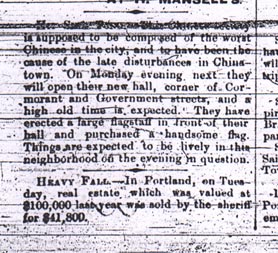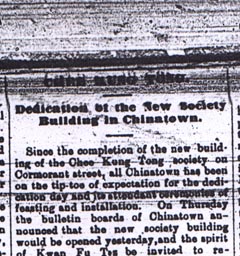What do the Papers Say?
Compare and contrast the 1884 Colonist article on the opening of the Hip Sing Tong's new hall with the 1886 article, also from the Colonist, on the opening of the Chee Kung Tong's hall.
While the writer of the first article makes no bones about stating outright that the Hip Sing Tong is "made up of the worst Chinese," the writer of the second piece may be having trouble reconciling his preconceived notions of tongs and accepting the fact that the Chee Kung Tong may not be as bad as they seem. What do you think?
(Note that the transcription of the second article has been broken into smaller paragraphs to aid reading.)
Daily
British Colonist
 HIP
SING TONGS--This Chinese society is supposed to be composed of the
worst Chinese in the city, and to have been the cause of the later
disturbances in Chinatown. On Monday
evening, next they will open their new hall, corner of Cormorant and
Government streets, and a high old time is expected. They
have erected a large flagstaff in front of their hall and purchased a
handsome flag. Things are expected to be
lively in this neighborhood on the evening in question.
HIP
SING TONGS--This Chinese society is supposed to be composed of the
worst Chinese in the city, and to have been the cause of the later
disturbances in Chinatown. On Monday
evening, next they will open their new hall, corner of Cormorant and
Government streets, and a high old time is expected. They
have erected a large flagstaff in front of their hall and purchased a
handsome flag. Things are expected to be
lively in this neighborhood on the evening in question.

CHEE KUNG TONG
Dedication of the New Society Building in Chinatown
Since the completion of the new building of the Chee Kung Tong Society on Cormorant street, all Chinatown has been on the tip-toe of expectation for the dedication day and its attendant ceremonies of feasting and installation. On Thursday the bulletin boards of Chinatown announced that the new society building would be opened yesterday, and the spirit of the Kwan Fu Tez be invited to reside in the worship room.
At 12
o’clock on Thursday night gongs were sounded, cymbals clanged,
and hundreds of firecrackers and bombs made a pandemoneum
not only sufficient to awaken the dead, but intended to awaken the
attendant spirit of Kwan Fu Taz that they
might accompany him to the idol placed in the building, where he is
supposed to reside henceforth. Kwan Fu Taz
meaning the philosopher, represents the
spirit of a great Chinese philosopher, next in learning to the great
Confucius, who is the embodiment of a righteous Chinaman. The idol
that contains the sacred spirit, was recently imported from
Though plain in architecture, the new building is very substantial and cost $5000 to build. The first floor is used for the lodge room and is appropriately decorated with banners, scrolls, and patriotic inscriptions relating to the old time Chinese government. At one end of the large room a smaller room is seen, which is used for the initiation of new members, and the trial of accused persons, in fact, it is a supreme court where laws are made in opposition to those of our own courts, and plans matured to defeat the ends of English criminal procedure against members of the society. On the floor above the worship room is located, and aside from the splendid altar surrounding the idol, there is very little of interest to a stranger. No attempt at fine finish, or fresco work is made; all is plain and in the rough.
The altar is an excellent piece of carving and months of patient work were consumed in its construction. It is black and gilt and reaches to the ceiling like a huge canopy over the throne of a king. Inside sits the great philosopher Kwan and on his right is his son exalted to this high favor on account of his father’s greatness, while on the left the attendant looks askance at his lord and master. Suspended in front of the idol is a lamp which is kept burning continually. It is emblematic of constancy, conveying the idea to the members that they must forever continue to exercise good. In front of the altar is a large table containing grotesque figures, and a great variety of sacrificial offerings, comprising flesh, fish and fowl, for the spirits to eat all that is spiritual and the chinamen get away with the substance left, which of course is the lion’s share.
 A valuable
piece of sandal wood leans against Kwan’s son and pieces are cut from it
by the master of ceremonies and characters are placed upon
them corresponding with a book which he has in his
possession. It is the custom for a Chinaman about to undertake any
move to pray to Kwan, after which he shakes a cup containing these
sticks and selects one, which he takes to the master of ceremonies, who
refers to his book and tells whether he will be lucky. If the
answer is favorable he starts forth with
confidence in his luck. If the answer is unfavorable,
no power on earth could influence him to attempt his undertaking.
All the mottoes around the walls relate to justice and the old Chinese
government, and the workings of the society are not unlike
masonry. Indeed, it is said that they make signs which masons of
every country understand.
A valuable
piece of sandal wood leans against Kwan’s son and pieces are cut from it
by the master of ceremonies and characters are placed upon
them corresponding with a book which he has in his
possession. It is the custom for a Chinaman about to undertake any
move to pray to Kwan, after which he shakes a cup containing these
sticks and selects one, which he takes to the master of ceremonies, who
refers to his book and tells whether he will be lucky. If the
answer is favorable he starts forth with
confidence in his luck. If the answer is unfavorable,
no power on earth could influence him to attempt his undertaking.
All the mottoes around the walls relate to justice and the old Chinese
government, and the workings of the society are not unlike
masonry. Indeed, it is said that they make signs which masons of
every country understand.
This society has excellent rules and regulations; in fact, their name Chee Kung Tong means equity or justice to all. The real workings of the society seem to be in direct opposition to their mottoes. Their principal occupation is to intimidate Chinamen not members, and every Chinese woman who comes to this country has a tax levied upon her head and they are given no peace until the tax is paid. There are two Chinawomen here now not able to pay the tax and they dare not leave the island. They live in constant fear of their lives and know they will be mercilessly pursued wherever they go until the amount is paid. The society says it is just in extorting the money, for if the woman gets in trouble it helps her.
The
jostling crowd of Chinese that moved about in the lodge room last night, was very serious in the formalities
attending the opening of their building, and there is much of a
serious nature beneath all the show and glamor.
They are zealous workers in the hidden cause of
The Black
Flags, who fought recently with the French in
